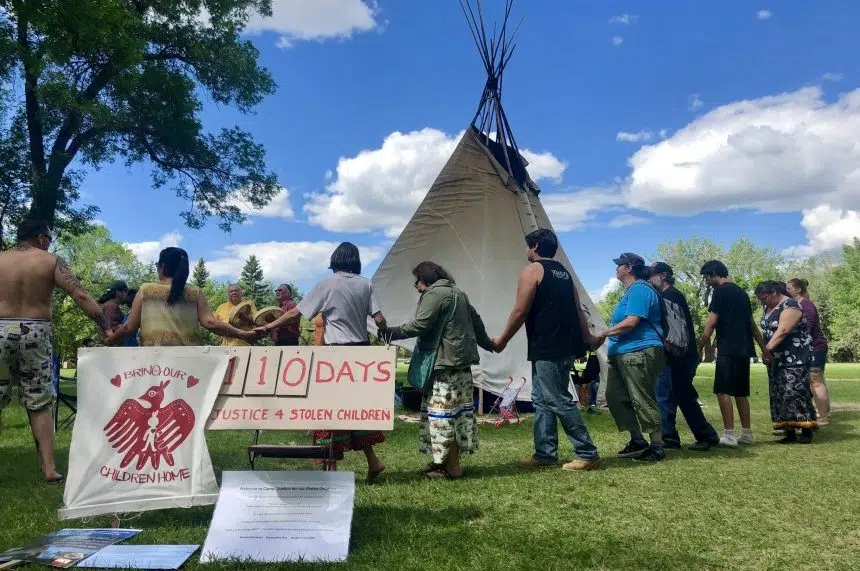The teepee still stood tall and the sacred fire continued to burn in Wascana Park late Sunday afternoon, a few hours after the Justice for our Stolen Children camp’s eviction deadline.
“(Noon) was the deadline that (the province) had indicated for the teepee to come down — and the teepee did come down, then it went back up,” said Robyn Pitawanakwat, a camp supporter who speaks for the Colonialism No More activist group.
“It was a symbolic gesture and it’s to say that ‘we are here to stay and every issue we had coming into this, we still have — none of the concerns have been addressed properly. We will continue to stay here until there is justice.'”
Pitawanakwat said the camp was initially formed after two high-profile homicide acquittals, but after 110 days, the camp’s expanded its focus.
“Justice could be deeper investigations into the deaths of our loved ones, it could be the return of Indigenous children to their families,” she began to list, noting a look at Saskatchewan’s foster care system is crucial to the camp.
“We know residential schools are wrong, we know how horrible they were. The trauma that children experience when they go into foster homes and are ripped away from their families is the same.”
Elder Archie Weenie leads the Justice for our Stolen Children camp in an honour song this afternoon in Wascana Park. The province gave the camp until noon today to take down its teepee, but the camp’s Robyn Pitawanakwat says they’ll “stay here until there’s justice.” #yqr #skpoli pic.twitter.com/YD9PHn5Ygj
— Jessie Anton (@jessieanton_) June 18, 2018
Justice Minister Don Morgan told reporters in Saskatoon last Friday the province is willing to have those conversations with its Indigenous people.
“Let’s try and identify what those issues are and what kinds of things can we do. I think it has to be an element of being realistic,” he said.
“We can’t fix issues that have been there for 150 years, but if there is an issue with child welfare or there’s an issue with the federal government … we’ll make the offer to welcome any invitation or make an invitation with the federal government to try and make results.”
According to Pitawanakwat, whenever officials from the province visit the camp, neither its spokespeople nor its Elder are around to discuss the issues they’re trying to address.
“When (the province comes) in and (meets) with only one or two people, it’s undermining the whole group because we’re not just one or two issues,” she said.
Once the camp’s teepee was torn down and rebuilt early Sunday afternoon, Pitawanakwat said more people than she could count circled it twice over in a round dance.
“It symbolizes to me that there’s a need and a want for this teepee to stay — for this group to stay here.”











